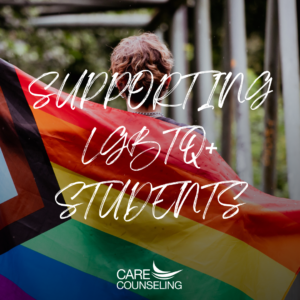Supporting LGBTQ+ Students
 In today’s diverse and ever-evolving educational landscape, creating an inclusive and safe environment for all students is paramount. LGBTQ+ (Lesbian, Gay, Bisexual, Transgender, Queer/Questioning, and more) students often face unique challenges that can impact their well-being and academic success. School counselors play a crucial role in championing diversity, equity, and inclusion, and can take proactive steps to ensure that LGBTQ+ students feel supported and valued.
In today’s diverse and ever-evolving educational landscape, creating an inclusive and safe environment for all students is paramount. LGBTQ+ (Lesbian, Gay, Bisexual, Transgender, Queer/Questioning, and more) students often face unique challenges that can impact their well-being and academic success. School counselors play a crucial role in championing diversity, equity, and inclusion, and can take proactive steps to ensure that LGBTQ+ students feel supported and valued.
Understanding the Challenges:
LGBTQ+ students may encounter a range of challenges that impact their educational experiences. These challenges can include:
- Bullying and Discrimination: LGBTQ+ students are at a higher risk of experiencing bullying and discrimination, both in person and online. This can have a detrimental impact on their mental health and self-esteem.
- Mental Health Concerns: LGBTQ+ students may struggle with higher rates of depression, anxiety, and suicidal ideation due to societal stigma and lack of acceptance.
- Lack of Representation: A lack of LGBTQ+ representation in curricula and classroom discussions can make students feel invisible and excluded.
- Misgendering and Deadnaming: Insensitive use of pronouns and referring to transgender students by their former names can cause distress and discomfort.
- Isolation and Alienation: Feeling isolated or rejected by peers and educators can lead to feelings of alienation and hinder students’ engagement in learning.
Creating an Inclusive and Safe Environment:
School counselors are uniquely positioned to make a positive impact on LGBTQ+ students’ lives by fostering an environment of acceptance and support. Here are ways they can help create an inclusive and safe space:
- Education and Training: Offer professional development for staff on LGBTQ+ issues, including terminology, respectful language, and understanding the experiences of LGBTQ+ students. This can help educators become allies and advocates.
- Visible Support: Create visible symbols of support, such as posters, pride flags, and inclusive signage, to show that LGBTQ+ students are welcome and valued.
- Safe Spaces: Designate physical spaces in the school where LGBTQ+ students can seek support and find resources. Ensure that these spaces are known to students and remain confidential.
- Counseling Services: Offer LGBTQ+ students a safe and nonjudgmental space to discuss their concerns. Counselors should be trained to address LGBTQ+ issues sensitively and competently.
- Gender-Inclusive Facilities: Advocate for gender-neutral restrooms and changing facilities to accommodate transgender and non-binary students’ needs.
- Pronouns and Names: Encourage the use of correct pronouns and preferred names for all students, especially transgender and non-binary individuals. Educate staff on the importance of respectful language.
- Curriculum Diversity: Advocate for the inclusion of LGBTQ+ history, literature, and contributions in the curriculum to help all students understand and appreciate the diversity of human experiences.
- Support Groups and Clubs: Facilitate LGBTQ+ student groups or clubs where students can connect, share experiences, and support each other.
- Crisis Intervention: Be prepared to address incidents of bullying, harassment, or discrimination promptly and effectively, ensuring that students feel safe reporting such incidents.
- Engaging Families: Reach out to parents and guardians to promote understanding and acceptance of LGBTQ+ students. Provide resources for families seeking guidance on how to best support their children.
Building a Culture of Acceptance:
Creating an inclusive and safe environment for LGBTQ+ students is an ongoing process that requires commitment from all members of the school community. School counselors can collaborate with teachers, administrators, parents, and students to build a culture of acceptance and respect. By openly addressing the unique needs of LGBTQ+ students and advocating for their rights, school counselors contribute to a learning environment where every student can thrive.
As we continue to strive for equity and inclusivity in education, it is imperative that we recognize and celebrate the diversity that enriches our school communities. By fostering an atmosphere of understanding, compassion, and acceptance, school counselors play an instrumental role in ensuring that LGBTQ+ students feel seen, valued, and empowered to achieve their fullest potential.



























